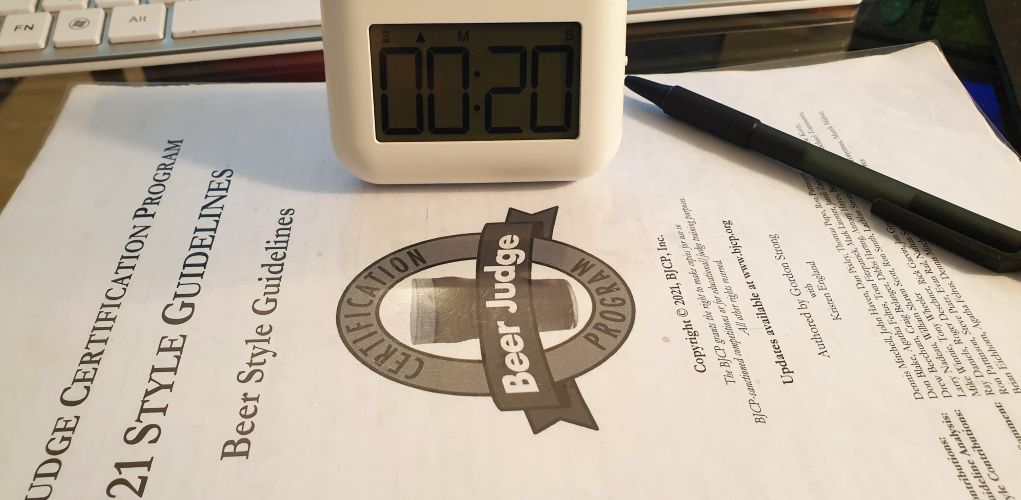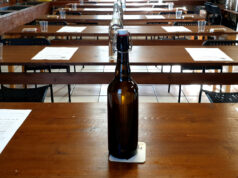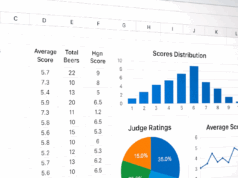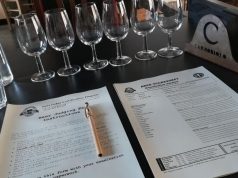Finally, in October 2022, I took the BJCP Written Exam. I haven’t gotten the result back yet, but at least I managed to answer all the questions in the given time without cramping which is already a success. I got an 80 score at the Tasting Exam, so I need at least an 80 on the Written Exam to level up to National.
I am, of course, not a grader nor an exceptionally experienced judge (like the Masters out there) and, as I said, I don’t know yet if I passed the Written Exam. But I decided to write about how I prepared for this difficult exam anyway. Regardless of my scoring, I learned a lot during this journey. I think it could be valuable information for those who are thinking about taking the Written Exam themselves.
There are some guides in the web but I won’t list them all (you can find a list here), I’d instead focus on my personal experience. I’ll start with some general advice and then delve into each exam question. I published already some of my tools and thoughts about this exam. You can find them here and here.
I hope you will find it helpful. Don’t hesitate to get back to me for more information, feedback and any doubt about the exam.
So, without further ado: let’s get to it!
[SPOILER: my score was a stunning 93/100! More on that here]
General Advice
Let’s start with some general advice on how to set your mind to prepare for this challenging exam. It is not something that you can master from day to night, it requires the right mindset and an organized schedule.
Don’t rush it
There is a lot of stuff to memorize. Trying to do so in a short time could be overwhelming and exhausting. It is tough to get a decent score without having already gathered a solid knowledge of most beer styles (practical and theoretical), a deep technical knowledge of the beer brewing process, ingredients and major off flavours. Experience in homebrewing helps – a lot – in recipe formulation.
How to do that? Judging – a lot – in competitions, traveling abroad to taste beer styles locally, brewing beer at home. And, of course, studying.
There is a reason why the BJCP requires at least 10 experience points and a score of at least 80 on the Tasting Exam before even let a judge try to take the Written Proficiency Exam. Of course they also want to improve the average quality of essays the graders are asked to review, but these requirements are also a warning for those who wake up one day and decide to become a National Judge. Simply put: it ain’t going to happen.
Before even trying – and I don’t yet know If I succeeded – I went through a long path of learning about beer. I have been a homebrewer for ten years now, teaching homebrewing in Italy for years. I teach in beer tasting courses, particularly about ingredients and the brewing process, but also off-flavours. I wrote a 400 pages book about homebrewing which got to the second edition in 2022. I regularly write for beer magazines in Italy. I have been judging a lot in competitions in Italy and abroad. This is not to brag, but just a warning that even with a handful of experience and knowledge, it will be a tough ride.
So, take your time before rushing into the exam. Absorb beer knowledge step by step and enjoy the journey.

Plan, start well in advance and stick to a schedule
Even if you think you know a lot about beer, it won’t be enough to pass the Written Exam with a score that will get you somewhere. Passing it without leveling up is useless.
It depends on your tasting exam score. Since it requires an average score of 80s between the two exams to get at least to the National level, it’s going to be easier to level up with a 90 at the tasting exam. But in that case I think the bar will spontaneously rise, pointing towards the Master level, making things even harder. Because, you know, nobody would want to try the Written Exam twice.
In any case, it is better to plan ahead. I started practicing for the Written Exam eight months in advance. Not a lot of studying every day, but at a constant pace. The silver lining of this exam is that it’s not necessary to taste beer to prepare for the exam, which is otherwise mandatory in the tasting exam preparation. This allowed me to squeeze studying easily into my daily routine: 15 minutes after coffee in the morning, 30 minutes after lunch and sometimes a bit of practicing after my daughter went to bed. In eight months there were just a bunch of days in which I did not practice.
Stick to the plan.
I started with a deep dive into each question, trying to figure out what they were really about and how to tackle them. I read through the BJCP Written Exam guide over and over again while making schemes and taking notes. I did not got into the helpful BJCP Exam Study Guide because I already had tons of books and study material from my previous experience, still it is something you should do if you don’t already have a solid knowledge about beer ingredients and processes.
Then I sketched schemes and layouts which guided me through answering each question (more on that later) and wrote down the answer for each question except for the Style Comparison (that would have been impossible). This is a great way to research and learn.
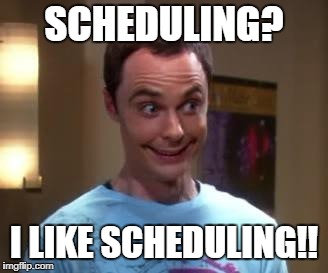
Practice. A lot.
As I said before, I continuously practiced each question for months. A bit per day, almost every day. I timed all the answers to squeeze into the 90 minutes time frame and practiced completing each question in the given time with ease. At the beginning it was hard, but gradually it felt more natural. The timing schedule was something like that:
- S1 (T/F) -> 2 mins
- S2 (Q1) – Styles Comparisons -> 18 mins (some triplets can be completed in 15, others require 20)
- S2 (Q2) – Recipe Formulation -> 20 mins (the longest, a lot to write)
- S2 (Q3) – Styles Comparisons -> 18 mins (some triplets can be completed in 15, others require 20)
- S2 (Q4) – Off Flavours -> 15 mins (5 mins for each off-flavour)
- S2 (Q5) – Beer Characterstichs 12 mins (it depends on which one you get, some can be completed in 10 mins, others require 15 mins)
Struggle to leave 2-3 mins spare for emergencies and for checking rapidly again the T/F questions when you finish. It will avoid having points detracted form the overall score which is a pain in the arse!
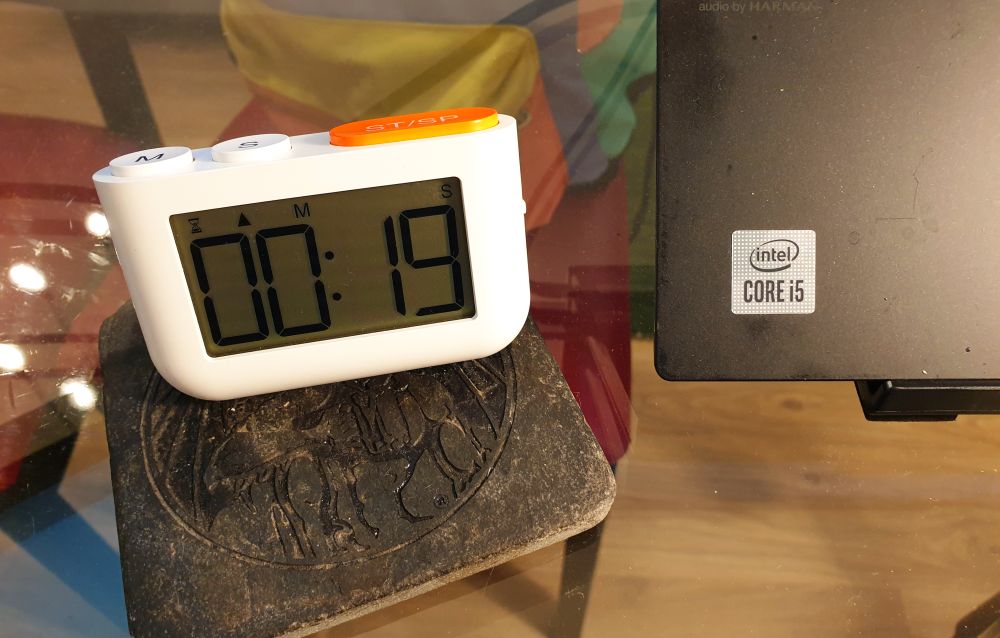
Make schemes and summary tables
I tried to organize all the knowledge in a mannerly fashion with tables and infographics. Comparing and contrasting data organized in tables and schemes is easier and less painful. I’ll go through the main schemes that I sketched in the following posts, but you can find some examples of what I mean in my Belgian Styles and Stouts infographics.
Be organized. Be comfortable
After some practicing, going through the 5 exam questions will become easier. It is pivotal to get comfortable in writing the answers because there will not be time for hesitation during the exam. Memorize schemes that will fit the information you want to get across in an orderly fashion. The last question is the more critical, because it can range from ingredients to process. Work out a schematic answer for each option of the last question and practice it. A lot.
Practice the whole exam at least 2 or 3 times to verify that you can reach the end without cramping. It took me some months of practice to get comfortable with writing down all the answers in a clear, schematic and organized way.
Let’s now get to the actual questions. I’ll start with the first one, which is sneaky because it won’t get you any points. At worst, it will detract them from your overall score!
Question S1 – Judging Process & Ethics
The first section is a list of 20 True/False question pulled randomly from a set of 124 questions. The list is here, together with all the correct answers. You won’t get any points from this section. Conversely, you will lose 0.5 points for every wrong answer.
If you get an 80 from the other 5 questions on Section 2 and you fail 2 T/F questions, your total score will decrease to 79. Evil.
The questions cover the BJCP judging process and BJCP ethics. Most of the questions are pretty straightforward, any judge with a minimum experience in judging and competitions should know the correct answer. Some (approx 10-20) are tricky ones: if you don’t read them carefully, they will fail you.
Once you got enough pratice, answering to all the 20 questions won’t take more than 2 minutes. I strongly advise checking them again rapidly at the end of the exam, just to be sure you will not lose important points.
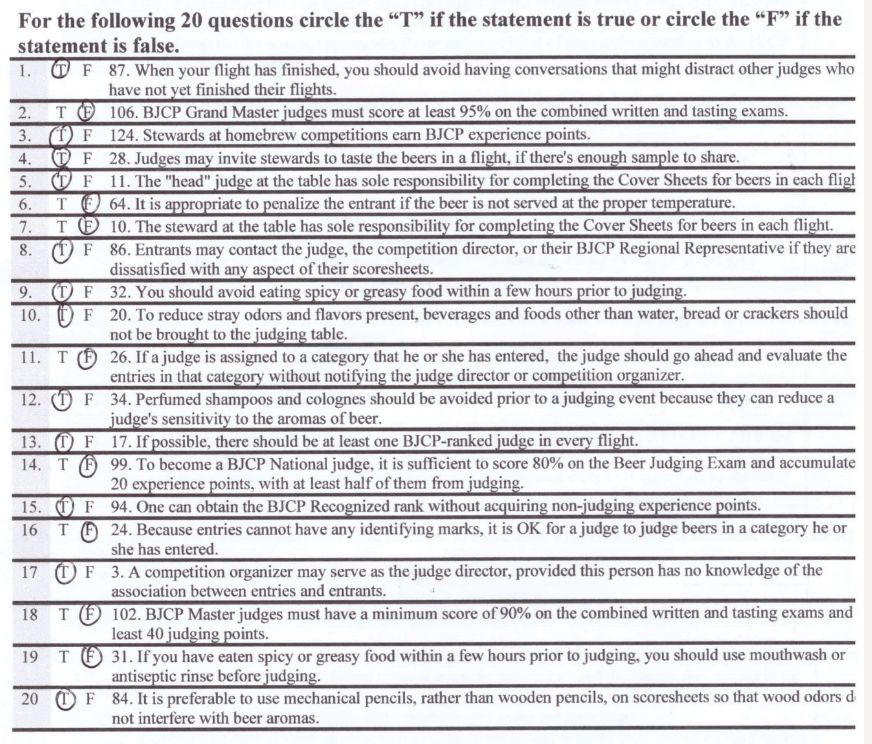
I advice practicing with 20 random questions at least once a day for some months. It won’t take more than five minutes, it is easy, almost fun, and it helps to memorize all the answers. Moreover, the most tricky ones will stand out in time and won’t trick you anymore.
There are some tools online that you can use to practice, but it is not clear when the pool was updated. So I did not trust them. I made a practicing Excel myself where you can see the pool of questions and change it easily if needed.
In the next post, I will cove the Styles Comparison Question in detail, the famous style triplets!

